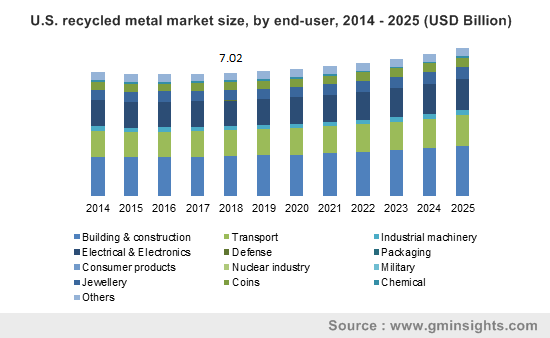3 important trends driving recycled metal market share
Recycled metal market has indeed carved out a momentous place for itself in the realm of advanced materials, plausibly on account of the growing concern among metal product manufacturers regarding the sustainability benefits of metal recycling. With the proliferation of rapid industrialization and urbanization trends across the globe, the demand for metals has observed a meteoric rise.
U.S. recycled metal market size, by end-user, 2014 – 2025 (USD Billion)

Environmental impact of metal mining
Having considered the adverse impact of mining on the environment, metal product manufacturers have been inclining toward recycled metals, thereby providing a major impetus to recycled metals industry. As of now, the crucial matter of contention about global warming due to rise in carbon dioxide emissions in the environment has been fueling the need for recycling.
Consequently, activities such as mining and solid waste accumulation in landfills that lead to the destruction of biodiversity have been cast in a negative light, resulting in a massive shift of preference toward recycled metals. Also, regional governments and private companies are likely to save up on capital post adopting the practice of recycling metals, given that the energy consumed for metal recycling is far lesser as compared to extracting ores.
In effect, metal recycling only serves to give rise to a sustainable economy that seems to be the need of the hour, the recognition of which has led to a major spurt in recycled metals demand across myriad geographies.
Government initiatives to the rescue
Speaking about the initiatives taken by the regional governments with regards to metal recycling, it would be imperative to mention the instance of the Rwanda government having undertaken significant steps to strengthen the industrial sector in the region by encouraging the practice of metal recycling. In accordance, the government has taken efforts to establish metal scrap collection centers from where the waste metal can be recollected and recycled into construction materials like iron bars.
Get a Sample Copy of this Report:@ https://www.gminsights.com/request-sample/detail/2792
The Rwanda government also framed a national e-waste management strategy through which it has been providing incentives for metal scrap collection and establishment of dismantling facilities. The efforts undertaken by the Rwanda administrative body are indeed an apt instance demonstrating the role that governments have to play in the growth of recycled metal industry size.
Regional outlook – regulatory enforcement & rising product demand across end-use domains
North America recycled metal industry has gained exceptional prominence across the globe in the last couple of years, which can be credited to the rapidly expanding electrical & electronics sector in the region. Already a technological hub in itself, the region houses a plethora of E&E companies that contribute toward the country’s GDP.
The regional electrical & electronics domain is lately on a tremendous rise on account of the constant upgradations in electronic architecture and the ever-changing demand of consumers with regards to electronic goods. Driven by the widespread applications of recycled metal for metal plating electronic components through electrodeposition, North America recycled metal industry is forecast to accrue substantial valuation in the ensuing years.
Another pivotal reason responsible for the growth of North America recycled metal market is the presence of an increasing number of core companies that have been rather proactively adopting strategic tactics to consolidate their stance in the home continent and overseas. For instance, merely a few days ago, the aluminum recycling company, Novelis signed an agreement to acquire a leading manufacturer of recycled aluminum products, Aleris. In 2016, Aleris used nearly 734,000 metric tons of recycled aluminum in its products.
The company majorly supplies its recycled metal products to the defense, automotive, construction, aerospace, and packaging industries. Consequently, this acquisition will prove to be beneficial for Novelis not only in terms of business expansion but also in terms of retaining Aleris’s widespread customer base.
Geographically speaking, APAC has also strongly consolidated its position in the global recycled metal industry. Driven by a stringent regulatory spectrum that mandates norms pertaining to environmental protection, APAC recycled metal market share is anticipated to grow at a CAGR of 4% over 2019-2025. The ecological concerns can be attributed to the surging number of mining activities for iron ore. Additionally, rising awareness is being generated in the region regarding the usage of recycled metals, pertaining to the fact that they provide companies with alternative economic savings in manufacturing.
The adoption of highly strategic business tactics is certain to have a transformational impact on the growth of recycled metal industry share. Additionally, the increasing awareness among regulatory bodies and private companies about the economic benefits of using recycled metal for new product manufacturing and infrastructure developments is also likely to augment the commercialization scale of this business space.
Driven by the extensive consumption of recycled metal across myriad industry verticals such as automotive, construction, aerospace, construction, F&B, consumer electronics, and packaging, recycled metal market will surpass a revenue collection of USD 85 billion by the end of 2025.
Author Name : Sunil Hebbalkar
This entry was posted in Polymers and Advanced Materials and tagged APAC Recycled Metal Market, Canada Recycled Metal Market, Europe Recycled Metal Market, Global Recycled Metal Market, Recycled Metal Industry, Recycled Metal Industry analysis, Recycled Metal Market, Recycled Metal Market 2018, Recycled Metal Market 2024, Recycled Metal Market application, Recycled Metal Market forecast, Recycled Metal Market outlook, Recycled Metal Market PDF, Recycled Metal Market report, Recycled Metal Market share, Recycled Metal Market size, Recycled Metal Market statistics, Recycled Metal Market trends, Reprocessed Metals Market, Scrap Metal Market, U.S. Recycled Metal Market.
